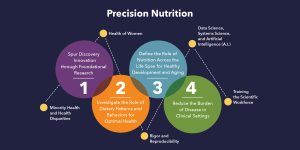What is precision nutrition?
Precision nutrition finds the most suitable diet for individual people based on one’s DNA, microbiomes, and metabolic reactions. (1) In the future, with the help of precision nutrition, scientists may be able to find more effective treatments for chronic diseases like obesity and cancer. (2)
Where is the future?
According to the 2020-2030 Strategic Plan for NIH Nutrition Research, here are four different directions for precision nutrition (3):
- Encourage innovative work in the foundational research
- What is the role of diet in health optimization?
- Over the lifespan, how can healthy eating affect the development and aging process?
- Understand the therapeutic role of food (food as medicine)

What can I do at Tufts?
- Listen to a Friedman Feature lecture during the fall or spring semester
- Register for a precision nutrition class, NUTR 248
- In this class, you will learn about nutrigenetics in precision nutrition, the value of high throughput omics techniques such as microbiome in precision nutrition, the impact of phenotyping, the controversy of precision nutrition, and its real-world application.
- Talk to professor who is specialized in this area
What are some career opportunities in this field?
- In the early stage of PF, data collection is essential. (4)
This could take place in hospitals, research institutes, and academia. Working as a data analyst, dietitian, or research assistant can get you started.
- Maintain data quality and relevance. Use data-driven methods to make recommendations.
In PF, data collection is critical. Professor Erin Hennessy is conducting research about a new dietary data collection method.
We can also think about blockchain (after data is collected, this technology could make it nearly impossible for others to change/hack the system) and its relationship with nutrition data collection. In the food system in general, here is an interesting article about food traceability and block-chain.
- Design PN studies that can validate by actual health outcome.
Going for another masters degree or starting a doctorate degree could be a choice as well. Try keywords such as: “microbiome”, “dietary recommendation”,” nutritional phenotype”, ”nutritional behavior change” and so on.
Special thanks to Friedman student Yucheng He for her amazing input for this article.


